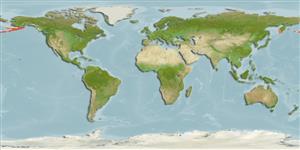>
Perciformes/Scorpaenoidei (Scorpionfishes) >
Sebastidae (Rockfishes, rockcods and thornyheads) > Sebastinae
Etymology: Sebastes: Greek, sebastes = august, venerable (Ref. 45335); ciliatus: Name from Latin 'ciliatus' meaning 'eyelash' (Ref. 27436) or 'eyelid', referring to the numerous accessory scales (similar to fringing eyelashes) on the psoterior field of the larger scales in most species of Sebastes (Ref. 53613).
Environment: milieu / climate zone / depth range / distribution range
Écologie
marin démersal; profondeur 5 - 160 m (Ref. 53613). Temperate; 58°N - 50°N
North Pacific: western Aleutian Islands and eastern Bering Sea, through the Gulf of Alaska, to southeast Alaska; including south to Johnstone Strait, British Columbia.
Length at first maturity / Taille / Poids / Âge
Maturity: Lm 29.0 range ? - ? cm
Max length : 53.0 cm TL mâle / non sexé; (Ref. 27437); poids max. publié: 1.8 kg (Ref. 40637); âge max. reporté: 67 années (Ref. 39247)
Épines dorsales (Total): 13; Rayons mous dorsaux (Total): 15; Épines anales 3; Rayons mous anaux: 8. Head spines weak to very weak - nasals usually present, parietals usually absent, preocular, supraocular, postocular, tympanic, coronal and nuchal spines absent (Ref. 27437). Two distinct types, (1) dark dusky - uniformly dark or dusky in color, symphyseal knob absent and, (2) light dusky - a larger, greenish brown fish, lighter ventrally, fins tinged with pink or orange, symphyseal knob present (Ref. 27437). Caudal fin slightly indented (Ref. 6885).
Found hovering in loose organized groups just above rocky reefs and along shorelines, or may rest singly upon rocky substrate (Ref. 27436). Feed by picking and seizing food items that are either drifting or suspended in the water column (Ref. 27302). Viviparous (Ref. 34817). Sold as fresh or frozen fillets; eaten as fish cakes (Ref. 27436). Captured by the nearshore jig fishery and has been reported to comprise up to 25% of the catch in the 'black rockfish' jig fishery of the northern Gulf of Alaska (citation in Ref. 53613).
Eschmeyer, W.N., E.S. Herald and H. Hammann, 1983. A field guide to Pacific coast fishes of North America. Boston (MA, USA): Houghton Mifflin Company. xii+336 p. (Ref. 2850)
Statut dans la liste rouge de l'IUCN (Ref. 130435)
Menace pour l'homme
Harmless
Utilisations par l'homme
Pêcheries: intérêt commercial mineur; pêche sportive: oui
Plus d'informations
CollaborateursImagesStamps, Coins Misc.SonsCiguateraVitesseType de nageSurface branchialeOtolithesCerveauxVision
Outils
Articles particuliers
Télécharger en XML
Sources Internet
Estimates based on models
Preferred temperature (Ref.
123201): 1.2 - 5.8, mean 4.1 °C (based on 65 cells).
Phylogenetic diversity index (Ref.
82804): PD
50 = 0.5000 [Uniqueness, from 0.5 = low to 2.0 = high].
Bayesian length-weight: a=0.01000 (0.00499 - 0.02004), b=3.09 (2.92 - 3.26), in cm total length, based on LWR estimates for this Genus-body shape (Ref.
93245).
Niveau trophique (Ref.
69278): 3.4 ±0.43 se; based on food items.
Résilience (Ref.
120179): Très faible, temps minimum de doublement de population supérieur à 14 ans (tmax=67).
Fishing Vulnerability (Ref.
59153): Moderate vulnerability (41 of 100).
